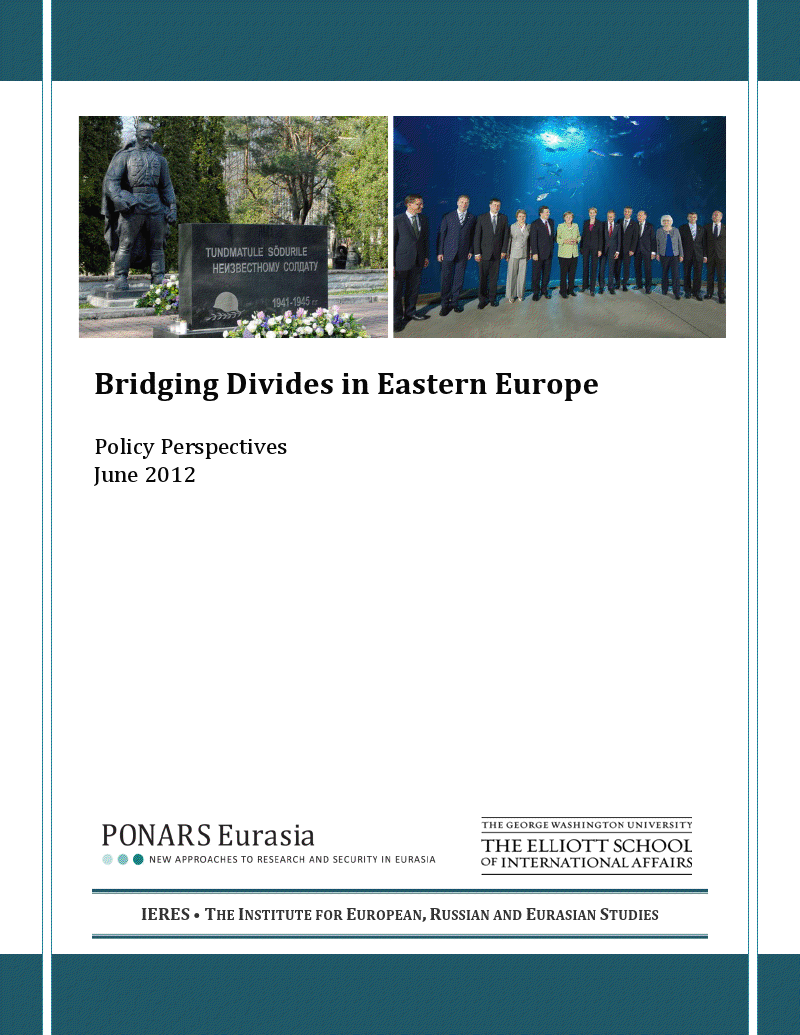Foreword
By Cory Welt
George Washington University
This collection of policy memos is based on the proceedings of a May 2012 workshop of the Program on New Approaches to Research and Security in Eurasia (PONARS Eurasia), held in collaboration with the Centre for EU-Russia Studies at the University of Tartu in Estonia. PONARS Eurasia is an international network of academics that advances new policy approaches to research and security in Russia and Eurasia.
The workshop, “Continuity and Change: Examining Regime Trajectories and Security in East Europe and Eurasia,” brought together scholars and experts based in the United States, the Russian Federation, and Estonia, as well as Armenia, Canada, Germany, Georgia, Kyrgyzstan, and Ukraine. Participants assessed the interplay between domestic and foreign policies in Russia, predicted possibilities for change in Russia’s current political- economic structure, and identified challenges to and potential avenues for cooperation across various Eastern European divides. We are publishing a number of policy memos from the workshop in two collected volumes, of which this is the second.
This volume, Bridging Divides in Eastern Europe, assesses political and foreign policy developments in the Baltic states and Ukraine and identifies potential trajectories for cooperation across various Eastern European divides. The four memos of Part I address issues relevant to Estonia and the other Baltic states, Latvia and Lithuania. Mark Kramer assesses the considerable accomplishments the Baltic states have made in terms of democratic consolidation, economic marketization, and security integration over twenty years of post-Soviet state building. He also takes a hard look at their ongoing challenges: demographic decline, ethnic minority integration, economic vulnerability, and incomplete historical memory. Kornely Kakachia examines one foreign policy implication of the Baltic transition to the Euro-Atlantic space—their sense of solidarity with, and ability to transfer knowledge to, post-Soviet states still queued up for Western integration, Georgia being a case in point. Yulia Nikitina interrogates the “post-colonial” frame that is frequently applied to Russia’s relations with its post-Soviet neighbors, including the Baltics. She asserts that the post-Soviet context is not comparable to post-colonialism, that such an analogy leads to mutual misreading of state intentions, and that a joint and honest reckoning of the past is one constructive step toward the establishment of normal neighborly relations. Ivan Kurilla builds on this latter theme, examining textbook treatments of World War II in Russia, Estonia, and other post-Soviet states and demonstrating how divergent historical memories help maintain divides between states and within them. For instance, Estonian textbooks treat those ethnic Estonians who found themselves having to fight on either side of the Soviet- Nazi line as legitimate nation-builders, even as postwar Russian migrants are conspicuously absent from the national narrative. Russian textbooks, on the other hand, leave no room in the national narrative for those who felt compelled to fight against Soviet power, whether ethnic Russians or national minorities.
Part II turns to contemporary Ukraine, offering two perspectives on President Viktor Yanukovych’s slide away from democratic governance and the inability of outside actors to effect a change of course. Olexiy Haran demonstrates how the administration has veered between governing through a polarization of society and its unification under more centralized rule. He maintains that Yanukovych still sees relations with the EU as a counterweight to Russian influence and seeks ways to achieve success in the next round of elections using administrative pressure but without overtly falsifying the vote, which could deliver a fatal blow to EU-Ukraine relations. Given Ukraine’s interest in retaining a European orientation, Serhiy Kudelia argues that the failure of Western actors to get Yanukovych to free former prime minister Yulia Tymoshenko from prison is puzzling. He explains that the incentives offered by the West have failed because compromising on the Tymoshenko case could cost Yanukovych his rule, something he seeks to avoid at all costs.
Finally, Part III assesses the future of three key relationships straddling various Eastern European divides. Andrey Makarychev sees growing strains in the German-Russian relationship, as Germany increasingly defines its relationship with Russia on the basis of European values and development. At the same time, he sees space for non-competitive relations in their common neighborhood, with states between them acquiring greater flexibility to pursue multiple paths of integration. Ayşe Zarakol argues that Turkey repeatedly errs in assuming a coincidence of interests with Russia on key foreign policy issues—be it the Nagorno-Karabakh conflict, Caspian pipeline construction, or, most recently, the Syria crisis. She argues that Turkish policymakers need to increase their expertise on Russia, temper their expectations of Russian foreign policy, and adjust their own strategies accordingly. Finally, Harris Mylonas analyzes the challenges of EU-Western Balkan relations. Noting how even NATO integration has proven challenging for the states of the former Yugoslavia and Albania, he maintains that EU integration is more difficult for at least three reasons: a lack of enthusiasm by key EU leaders facing disgruntled constituencies, EU enlargement fatigue, and intractable bilateral problems within the region itself. Ultimately, however, a lack of better alternatives will likely keep the integration project on track.
We are sure you will find these policy perspectives useful and thought-provoking. Many individuals were instrumental in the production of this volume, as well as the organization of the workshop that generated it. I would like to especially thank our colleague and co-organizer, University of Tartu Professor Viatcheslav Morozov; Managing Editor Alexander Schmemann; Program Coordinator Olga Novikova; Graduate Research Assistants Wilder Bullard and Justin Caton; IERES Executive Associate Caitlin Katsiaficas; and IERES Director Henry Hale. PONARS Eurasia, together with the George Washington University’s Elliott School of International Affairs, expresses its deep appreciation to the International Program of Carnegie Corporation of New York and the John D. and Catherine T. MacArthur Foundation for their ongoing support.










